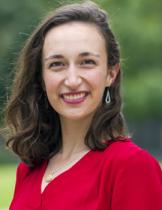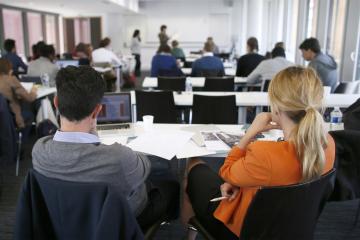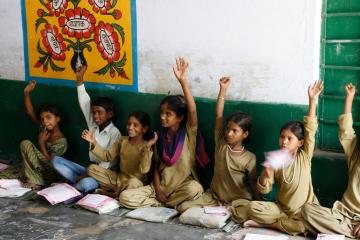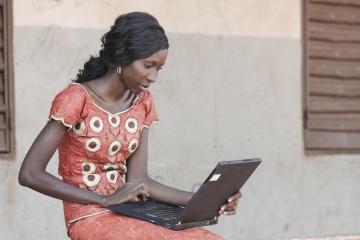
DEDP Alumni Spotlight: Pursuing research around the world while staying connected to the J-PAL community
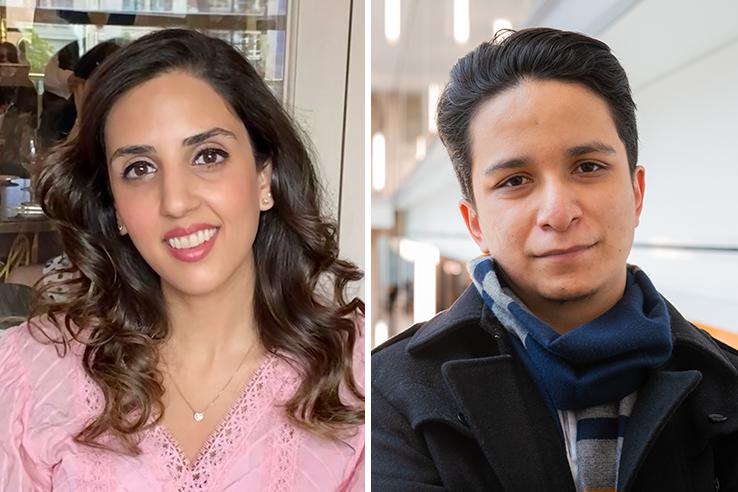
During a recent fireside chat with J-PAL Faculty Director Abhijit Banerjee, the students of the Data, Economics, and Development Policy (DEDP) master's program sought guidance on their post-graduation endeavors. Banerjee, who founded the DEDP program along with Esther Duflo and Ben Olken, responded: "Change the world." When prompted to elaborate, Banerjee declined to confine the potential of the students within his own definitions and recognized their exceptional qualifications, unwavering motivation, and the boundless possibilities on their horizons.
Graduates of the DEDP program are already on their way to realizing Banerjee’s vision. Since the inaugural 2020 cohort, 66 graduates have earned their master’s degrees, and the current cohort will graduate in September 2023 to join the alumni community. These students have made the DEDP program’s founding vision a reality as they go on to work in government, nonprofits, international organizations, and more. A growing number have also continued their journeys as researchers: six DEDP alumni are currently pursuing PhDs in economics at top institutions around the world, with several more beginning their programs in economics and related fields in fall 2023.
We caught up with a few of our alumni who are PhD students to learn about their work, goals, and journeys from DEDP to becoming researchers. In this installation of our DEDP alumni spotlight, we spoke with Nouf Abushehab (DEDP '20) and Brian Daza (DEDP '20) to hear their reflections on the DEDP program and their current work.
Stay tuned for future installments of our DEDP alumni blog series featuring graduates working in policy, tech, and more!
Exploring gender, poverty, and evidence-based policymaking in the Middle East
Nouf Abushehab is currently a PhD student at Trinity College Dublin. She credits the DEDP program with helping her transition from her previous work in her home country with the Economic & Social Council of Jordan into development research, and especially recalls the focus on research skills and quantitative skills, all brought together in the capstone internship. For her DEDP capstone internship, Nouf worked with the Trinity Impact Evaluation Unit on several projects related to gender and intimate partner violence.
Drawn to the Trinity economics department’s focus on development and gender, Nouf returned in 2022 as a research assistant working to evaluate a graduation from poverty program in Malawi before starting her PhD. Her research interests continue to center on development, poverty alleviation, gender, and women’s empowerment.
Nouf is also committed to taking part in expanding the role of policy-relevant research in the Middle East and was recently selected for the first cohort of the J-PAL Middle East and North Africa Scholars Fellowship, which supports early career researchers looking to work on randomized evaluations in the region with mentorship from J-PAL affiliates. She says, “My personal goal would be to contribute to the movement expanding the use of research and rigorous evidence in Jordan and the Middle East, and I’m very keen on continuing to work with the J-PAL research network,” Nouf says. Seeing a DEDP alum go on to become a passionate advocate for global perspectives in development research is a remarkable moment for the program, and a reflection of the program’s success in training the next generation of researchers and decision-makers.
Opening doors to young researchers in Latin America
Brian Daza is a PhD student at the University of Michigan. Hailing from Peru, his journey to the DEDP program began with, as Brian describes it, “the best Google search of his life.” The search led him to the DEDP MicroMasters course Foundations of Development Policy. Like many DEDP students, Brian completed the MicroMasters courses while working full time, and even watched many of the lecture videos during his long bus commute to work at the Unit of Planning and Budget of the Peruvian Ministry of Education in Lima.
The MicroMasters led Brian to work in research at the Universidad del Pacífico with Professor Jorge Dávalos, and then to MIT where he joined the inaugural DEDP master’s cohort. Brian recalls that both the students and faculty were welcoming and invested in building a supportive community, which turned out to be crucial when MIT went into Covid-19 lockdown just three months after the students arrived. Working with MIT faculty solidified Brian’s interest in pursuing a PhD and becoming a researcher himself, driven by a commitment to foster inclusivity within academia in Latin America for his peers.
To that end, Brian co-founded EconThaki, a platform for aspiring economists in Latin America to share information, learn new research skills, and connect with each other. Brian continues to work toward a diverse and equitable approach to research, saying, “At EconThaki, we believe that encouraging diversity in economics research is necessary. Not just for fairness, but also to increase the quality and scope of the discipline. We are sure that the inclusion of people of different origins, perspectives and abilities will improve the quality of tools and evidence policymakers will have at their disposal to improve the lives of their most vulnerable citizens.”
In his own research, Brian is interested in trade, development, and macroeconomics—for example, investigating the impact of globalization on households and small firms and understanding the barriers to ending child labor in his home country of Peru. Brian’s research and advocacy work strives to equip policymakers with evidence-based tools to improve the lives of marginalized communities and uplift fellow young researchers from Latin America in economics.
Join our program
DEDP alumni continue to have an impact on the program as they move on to pursue their own research, just as Nouf and Brian are now doing. With each graduating cohort of DEDP students, it becomes increasingly clear that the program’s model of sharing MIT courses online and bringing dedicated and talented MicroMasters credential-holders to MIT has been successful in building a community of graduates who are ready to change the world. Pursuing a PhD and becoming a researcher is just one of the ways in which DEDP alumni are making a difference, and we will continue to share their stories!
Interested in joining the DEDP master’s program? Begin working toward the DEDP Micromasters credential—summer courses start on May 30. To get started, create an account and enroll in courses on MITx Online. You can also learn more about DEDP master’s admissions, curriculum, and our current students on the MIT Economics website.
